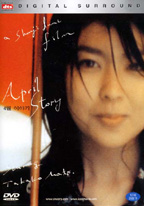

Shigatsu monogatari
Japan 1998
Genre:
Romance
Director:
Shunji Iwai
Cast:
Takako Matsu
Seiichi Tanabe
Kahori Fujii
Kazuhiko Kato
Kae Minami
Kanji Tsuda

April Story
Story: Uzuki (Takako Matsu) leaves her hometown to study at Tokyo university. The shy, young girl is
very busy with moving into her new home and is still quite insecure in her new environment. But it doesn't take very long and she finds
some new friends and even joins a fishing-club. However, most of her time she spends with her books. After all, she manages to
approach her new neighbour, also a very incommunicative person, and bit-by-bit the young student finds out how to handle
her new life.
Besides, there seems to be a reason why she spends most of her spare time at a specific library. What or who is she looking
for? Apparently she is interested in the salesperson, but she's too shy to approach him. But why of all universities did
she decide in favor for Tokyo university? Does the answer lie in her past, and more importantly will she eventually have
the courage to approach the library's salesman?
Review: "April Story" is an extraordinary movie about a very shy girl, who has to get used to her new life
and in doing so finds out that apart from several obstacles, the world also has to offer a lot of beautiful things.
Shunji Iwai's work is everything else but the typical love-drama. No clichés are borrowed, the director doesn't aim
for some easy tears, but rather portrays an individual's life with a happy life-affirming undertone and a dream-like
beautiful atmosphere to go with it.
Shunji Iwai should be well known to everyone as the director of "Swallowtail Butterfly" or "All about Lily Chou-Chou".
This time, however, his work is more positive than his previous movie "Love Letter" and envelops you with the typical
Iwai-like magic.
What exactly makes Iwai's movies so special? Despite all simplicity, he can immediately enwrap the viewer with its
magical atmosphere. How does he manage to do so? For starters, there is the cinematography. As we can see in a lot of
movies by Iwai, the lighting is very important. Sometimes the brightness seems pretty accentuated and important.
A shining yet
comfortable dulled sunshine comes through the windows and creates a dream-like scenery. Outdoors, there are always
blossoms falling from the trees, covering the streets with a warm and fuzzy blanket. Peaceful nature-shots also add to a
almost meditative effect.
Even though there might actually happen only little on screen, the scenery immediately manages to capture you
and carry you off into a warm and soothing world. In addition, there is also the protagonist, portrayed by Takako
Matsu. Right away, we can relate to her, even if she might seem a bit stereotypical because of her sometimes rather reserved
and insecure character. Even so, I could sometimes recognize myself in her behaviour pattern, which
makes her even more human. As for the rest of the movie she keeps growing, she gets more like an adult and even a
bit self-confident. Her effort to integrate in her new environment finally pays off and she even gets some new
friends. The supporting roles on the other hand, rather fall by the wayside, but seemingly unimportant scenes like
the one where Uzuki invites her neighbour to dinner are supposed to show us how hard she tries to socialize.
It's quite refreshing to see a drama, which doesn't even really feel like one. For one thing, the movie's already
mentioned positive undertone is caused by some few subtly inwrought gags or some weird characters, like the girl, who
brings Uzuki into contact with fishing. This adds a special touch to the movie and the very simple plot is
strengthened, too, as we start asking ourselves why Uzuki wanted to study at this specific university. We don't
have to wait too long for the answer, but the end releases us as soon as we get the resolution. This is rather bitter
as "April Story" is just too short with its running time of merely 67 minutes, which only shows us one tiny section of Uzuki's
life. That is a pity because we really would have liked to stay a bit longer in this world.
What's the thing with the rather long sequence of the old Samurai-movie at the cinema (which is most certainly one of Shunji
Iwai's early experimental short movies), why does Uzuki's neighbour behave so strangely (the city resident's social
isolation?), why of all clubs, did the girl join a fishing-club? Anyone who asks these questions did not really
get the movie. We're only supposed to see a short section / a tiny but yet important part of Uzuki's life.
In the end, despite its apparent simplicity "April Story" gains an unusual profoundness, also due to Takako Matsu's
great performance. Many may ask themselves what the movie is supposed to convey as a message, what it is actually
about and what we are
supposed to do with the plot, but in the end, the last shot leaves us with an incredible warm feeling in our chests,
which lets us intuitively understand everything. In addition, the gorgeous dreamy atmosphere makes us forget about
some very few weaknesses. "April Story" is a movie which keeps growing in your heart long after having seen the last
picture of it.

Disclaimer





















